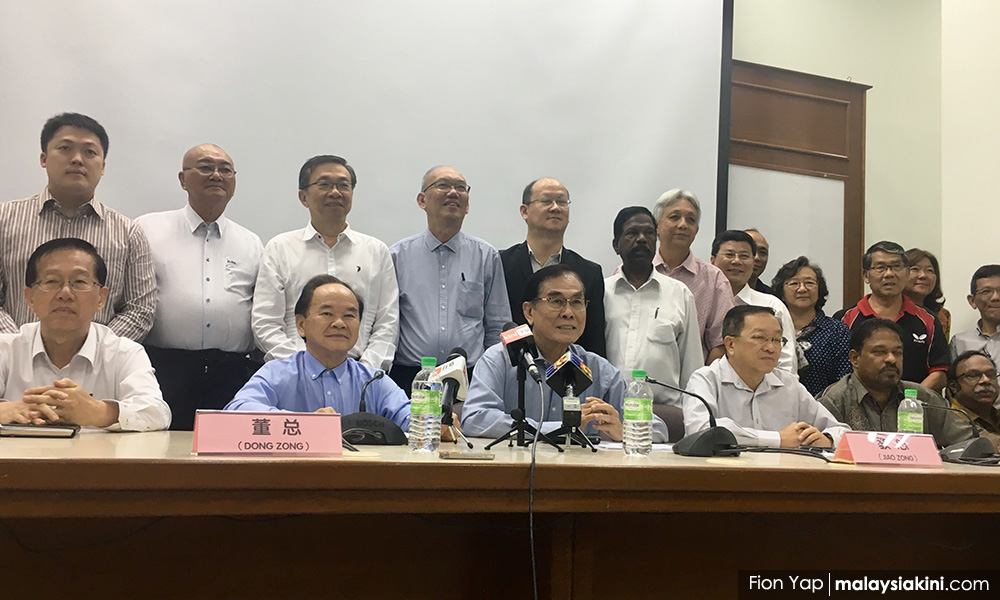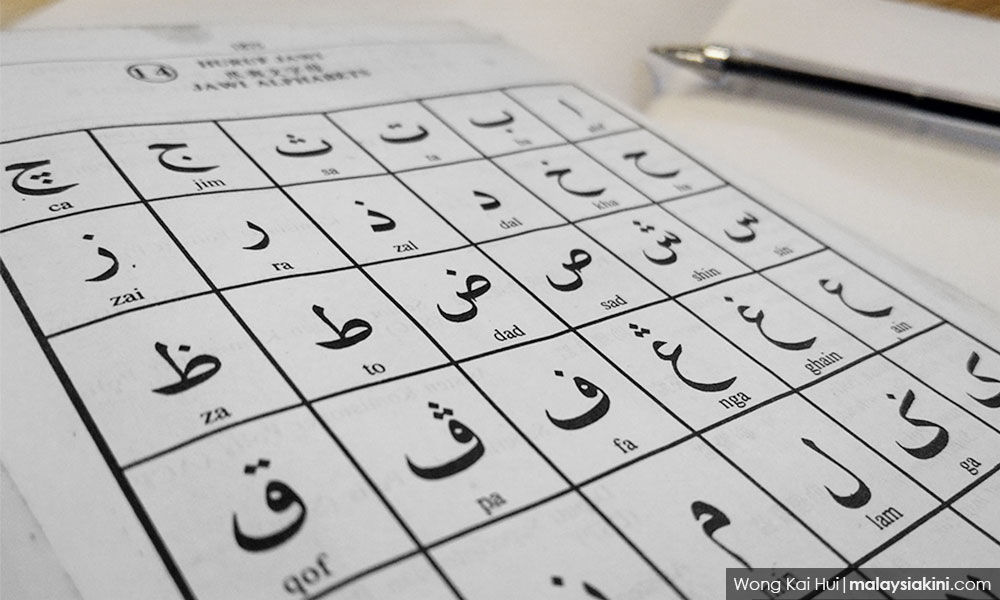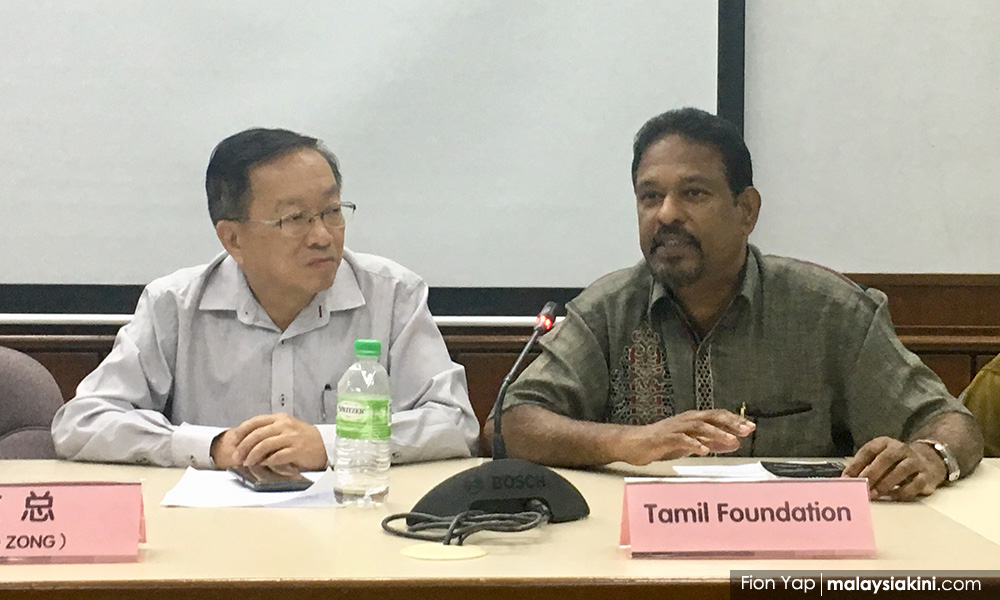
Chinese and Tamil education groups have urged Putrajaya to postpone the introduction of khat to vernacular primary schools.
The Education Ministry plans to include six pages on Jawi calligraphy writing in next year’s Standard 4 Bahasa Malaysia textbook.
Speaking on behalf of the groups today, Dong Zong (United Chinese School Committees' Association) president Tan Tai Kim urged the ministry to better explain the initiative before rolling it out.
“We remain cautious and wary of the Education Ministry’s statement (on introducing khat) because there are still many things which need to be clearly explained.
“[...] Before the ministry clearly explains these details to the public, we are of the view that the initiative should be postponed pending further discussions,” he read from a joint statement at a press conference at the Dong Jiao Zong building in Kajang.
Tan also urged the ministry to reveal the specific khat topics it intended to add to the Bahasa Malaysia textbook so that the public would know what was being changed.
“This is important to dispel any concerns and suspicions people may have, and (if) the initiative will fulfil the needs of vernacular school (SJKC and SJKT) students,” he added.
Not about patriotism but workload
Responding to criticism towards their stance against khat, Tan clarified that their opposition was based on grounds that it would create additional workload for vernacular school students.

“Opposing the introduction of khat into the Bahasa Malaysia syllabus is neither against the law nor does it have anything to do with patriotism or national harmony.
“A group of people have been intentionally linking any opposition to khat to questions of patriotism. They have been accusing anyone who is against khat as being disloyal to the country.
“This is slanderous and nonsensical,” he said.
Tan thus demanded that people stop spreading such “misinformation” as it could potentially lead to racial strife.
The groups stressed that they supported the ministry’s efforts to improve Bahasa Malaysia comprehension and cross-cultural exchange among students.
“However, this has to be done in a way that suits the needs of each school stream so that the traits and identity of each stream are not negatively affected,” said Tan as he read from the statement.
The Dong Zong president said the groups will meet with Deputy Education Minister Teo Nie Ching tomorrow (Aug 6) to express their views.
Insufficient time for BM
Tamil Foundation chairperson CM Thiraviam (below) highlighted how vernacular school students are already struggling to find enough time in their days to study the national language, let alone a new calligraphy style like khat.

“Khat is part of our culture and we have no problems with it, but Chinese and Tamil school students already have little time for Bahasa Malaysia.
“If we want to add new things to the syllabus, they will have even less time to study the language.
“We hope that the ministry will consider our views. If our demands are not met, we will not stop here. We will continue to bring our concerns forward,” he told the same press conference.
Earlier today, Dong Zong had lodged a police report and appealed for police protection over the next two days following rumours that groups had planned a demonstration outside its headquarters.
The protest did not materialise.
Tomorrow, 42 Malay organisations are slated to deliver a memorandum to the Chinese educationist group over the khat issue.
Dong Zong secretary-general Ng Chai Heng told the media today that they intend to accept the memorandum.
Prior to the press conference today, Dong Zong, Tamil Foundation along with 10 other groups had held a meeting over the contentious khat issue.
The groups are Jiao Zong (United Chinese School Teachers' Association); Hua Zong; Associated Chinese Chambers of Commerce & Industry (ACCCIM); Persekutuan Persatuan-Persatuan Alumni Sekolah China Malaysia; Gabungan Persatuan Alumni Universiti Taiwan; Merdeka University Bhd; LLG Cultural Development Centre; Majlis Bahasa Cina Malaysia; Persatuan Bekas Siswah Universiti dan Kolej di China; and Persatuan Titian Digital Malaysia. - Mkini



ReplyDeleteMalaysians Must Know the TRUTH
MONDAY, AUGUST 5, 2019
Seni kaligrafi Cina, Tamil telah lama dilaksanakan di sekolah, kata NUTP
Setiausaha Agung NUTP Harry Tan berkata, pengenalan seni tulisan jawi adalah bertujuan untuk menerapkan nilai warisan bahasa Melayu dan identiti negara dan tidak wajar dijadikan isu sehingga mengundang kontroversi.
PETALING JAYA: Kesatuan Perkhidmatan Perguruan Kebangsaan (NUTP) hari ini berkata, selain tulisan jawi, murid sekolah telah mengenali seni tulisan Cina dan Tamil sejak ia dilaksanakan kepada murid Tahun 1 pada 2011.
“Untuk makluman murid telah mula mengenali seni tulisan jawi, seni tulisan Cina dan seni tulisan Tamil sejak Kurikulum Standard Sekolah Rendah (KSSR) dilaksanakan kepada murid Tahun 1 mulai tahun 2011 dan pada tahun 2015, dalam buku teks Bahasa Malaysia Tahun 5 untuk sekolah jenis kebangsaan di bawah tema “Menghargai Budaya Bangsa,” katanya dalam satu kenyataan.
Sehubungan itu, setiausaha agung NUTP Harry Tan berkata, pengenalan seni tulisan jawi adalah bertujuan untuk menerapkan nilai warisan bahasa Melayu dan identiti negara dan tidak wajar dijadikan isu sehingga mengundang kontroversi.
Beliau berkata, tahun ini merupakan tahun semakan KSSR Tahun 4, justeru meminta supaya proses itu dibenarkan dijalankan oleh golongan profesional bagi mencari jalan supaya pembelajaran seni tulisan itu tidak membebankan murid di samping memupuk gaya penulisan yang indah.
Kenyataan Harry muncul berikutan kontroversi yang tercetus berhubung langkah Kementerian Pendidikan memperkenalkan tulisan jawi dalam subjek bahasa Melayu Tahun 4 di sekolah jenis kebangsaan baru-baru ini.
Setiausaha Agung NUTP Harry Tan.
Berikutan bantahan banyak pihak, termasuk pertubuhan pendidikan Cina Dong Zong dan Jiao Zong, Menteri Pendidikan Maszlee Malik mempertahankan langkah itu dengan berkata, ia bertujuan menerapkan nilai warisan bahasa Melayu sejajar dengan kedudukannya sebagai bahasa kebangsaan dan bahasa perpaduan.
“Perancangan tulisan khat ini dilaksanakan melalui semakan semula kurikulum sejak 2014. Usaha ini juga melalui pelbagai sesi libat urus dengan pakar bahasa dan pendidikan,” katanya dalam kenyataan.
Terdahulu Dong Jiao Zong berkata, ia tidak membantah usaha kerajaan melaksanakan interaksi kebudayaan antara pelbagai kaum, sebaliknya mempersoalkan kaedah yang digunakan oleh pihak kementerian dalam isu itu.
Berikutan mesyuaratnya hari ini Dong Jiao Zong meminta Kementerian Pendidikan menangguhkan pelaksanaan langkahnya itu.
Dalam satu kenyataan bersama dengan 10 kumpulan berkepentingan Tamil dan Cina lain ia berkata, kementerian perlu memberi penjelasan lanjut bahawa murid sekolah tidak akan menjalani ujian berdasarkan kemahiran menulis khat semasa peperiksaan walaupun ia dimasukkan dalam Dokumen Standard Kurikulum Pentaksiran (DSKP) dan sukatan pelajaran.
Pengerusi Jiao Zong, Ong Chiow Chuen, meminta kementerian berkenaan mendedahkan bahagian mana dalam silibus dan DSKP yang akan dipinda dengan memberi penjelasan lanjut tentang bagaimana tulisan jawi akan diperkenalkan di sekolah rendah Tamil dan Cina. - FMT
Mohd. Kamal bin Abdullah at 1:43 AM